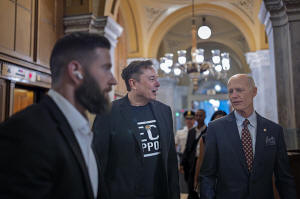Musk and DOGE try to slash government by cutting out those who answer to
voters
[March 10, 2025]
By NICHOLAS RICCARDI
DENVER (AP) — For decades, conservatives in Congress have talked about
the need to cut government deeply, but they have always pulled back from
mandating specific reductions, fearful of voter backlash.
Now, President Donald Trump's administration is trying to make major
cuts in government through the so-called Department of Government
Efficiency, or DOGE, run by billionaire Elon Musk — an initiative led by
an unelected businessman who's unlikely to ever run for office and was
appointed by a termed-out president who no longer needs to face voters
again.
The dynamic of cutting government while also cutting out those who
answer to voters has alarmed even some fiscal conservatives who have
long pushed for Congress to reduce spending through the means laid out
in the Constitution: a system of checks and balances that includes
lawmakers elected across the country working with the president.
“Some members of the Trump administration got frustrated that Congress
won't cut spending and decided to go around them,” said Jessica Reidl of
the conservative think tank The Manhattan Institute. Now, she said, “no
one who has to face voters again is determining spending levels.”
That may be changing.
On Thursday, facing mounting court challenges to the legality of Musk
ordering layoffs, Trump told his Cabinet that Musk could only make
recommendations about government reductions. And there were more signs
that Congress, after sitting on the sidelines for nearly the first two
months of Trump's administration, is slowly getting back into the game.
On Wednesday, Republican senators told Musk that he needed to ask
Congress to approve specific cuts, which they can do on an up-or-down,
filibuster-free vote through a process known as recission.

Senators said Musk had never heard of the process before. That was a
striking admission given that it's the only way for the executive branch
to legally refuse to spend money that Congress has given it.
“To make it real, to make it go beyond the moment of the day, it needs
to come back in the form of a rescission package,” said Sen. Rand Paul
of Kentucky, a longtime advocate of spending reductions who said he
introduced the idea of recission to Musk during the lunch meeting of the
GOP caucus.
Of course, letting Congress have the final word may be constitutional,
but it would open up the process to individual representatives or
senators balking at cuts because of home-state interests or other
concerns, as some have already. But Douglas Holtz-Eakin, a former
director of the Congressional Budget Office and an economist in George
W. Bush's administration, said that “messy” process is a superior one.
“There's always this instinct in people to insulate decisions from
politics,” Holtz-Eakin said. “It's a mistake in a democracy. It's really
messy. You're not going to get the cleanliness of a corporate
reorganization.”
Riedl noted she has advocated for deep cuts for decades, but there's a
reason Congress has balked.
“If Congress won't pass certain spending cuts, it's because the American
people don't want it enough,” she said. “If I want spending levels to be
cut, it's my job to persuade the people of America to agree with me.”
Trump and his supporters argue they did just that in the last
presidential election when he promised to shake up Washington: “The
people elected me to do the job and I’m doing it,” Trump said during his
address to Congress last week.

[to top of second column]
|

Elon Musk, center left, operating with a directive from President
Donald Trump to slash government spending, walks with Sen. Rick
Scott, R-Fla., right, as he arrives to meet with Republican
senators, at the Capitol, in Washington, Wednesday, March 5, 2025.
(AP Photo/J. Scott Applewhite)

A corporate-style approach to government has long been the goal of
conservatives, especially one segment that has recently called for a
more CEO-style leader who is less tied down by democratic
commitments to voters. Musk has embodied that, bringing the same
disruptive, cost-cutting zeal he brought to his private companies.
Some of his DOGE moves mirrored steps he took to slash the social
media site Twitter, including the email offering buyouts, both times
called “Fork in the Road.”
Don Moynihan, a professor of public policy at the University of
Michigan, said the effort seems more destructive than just an
attempt to shrink government in ways conservatives have long
advocated.
“It is usurping the role of Congress on spending and program design,
using cuts as a backdoor way to impound and close agencies created
by Congress,” Moynihan said. “It is implementing an unprecedented
scale of disruption.”
Grover Norquist, an anti-tax activist whose pledge to make
government small enough to “drown it in a bathtub” has made him an
icon for small-government conservatives, cheered the DOGE project.
He said Congress has to authorize any real reductions, but hoped
that DOGE's cuts show the legislative branch that voters will not
panic when government is shrunk.
“If we do something for three years, they'll make it the law,”
Norquist said of Congress. “They'll see it's safe, they'll see it's
successful. They'll come in and put their name on it.”
Norquist acknowledged that Congress has repeatedly balked at the
level of cuts that he would like to see, even under unified
Republican control. He asserted that “95%” of Republicans support
such reductions but “that wasn't enough to get it across the finish
line” in an era where the majority party usually only has a
razor-thin margin of control in either chamber.
The past nearly half-century of politics has been defined by
conservatives pledging to cut government spending, only to see it
continue to grow. Republican Ronald Reagan swept into the presidency
in 1980 pledging to cut government, but when he left eight years
later its size had increased. The trend continued through Trump’s
first term and during Democrat Joe Biden's presidency.
Now, however, Trump will not face voters again, despite occasional
quips about seeking a constitutionally prohibited third term. He has
been open about his grudge against the federal bureaucracy, which he
blames for many of his troubles during his initial four years in
office.
“I don't think previous presidents have had the same animus towards
the federal government this one has,” Holtz-Eakin said.
He noted that Trump has launched a second cost-cutting initiative
through traditional channels — his own Office of Management and
Budget, which asked agencies to prepare for mass layoffs. That,
Holtz-Eakin said, makes those coming reductions likelier to stick
than DOGE cuts.
Holtz-Eakin said there are initial signs of voter discontent over
the pace, depth and chaos of the cuts. "The usual way you visit that
on a president is you wipe out his party in the midterms,”
Holtz-Eakin said. “You never evade the voters.”
All contents © copyright 2025 Associated Press. All rights reserved |